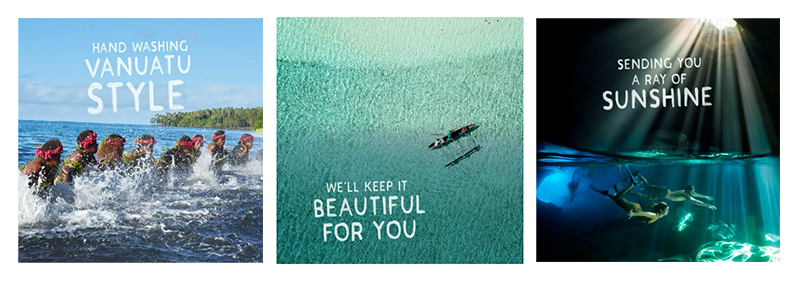In an innovative response to the COVID-19 pandemic, which brought global tourism to a halt in March 2020, Vanuatu’s national tourism destination marketing organization, the Vanuatu Tourism Office, launched campaigns to encourage tourists to return to the country once travel restrictions are lifted. The campaign’s slogans were ‘We’ll Keep it Beautiful for You’ and ‘We’re Saving You a Spot’.

The campaigns were informed by the 2019-2030 Vanuatu Sustainable Tourism Policy by the Vanuatu Department of Tourism, and in November 2019 the same department organized a Sustainable Islands Tourism Conference to kick start implementation of the policy.
The overarching vision of Vanuatu’s Sustainable Tourism Policy is “to protect and celebrate Vanuatu’s unique environment, culture, kastom and people through sustainable and responsible tourism.” The Policy includes five goals: 1) to develop and manage a sustainable and responsible tourism industry; 2) visitors connect with Vanuatu’s environment, culture, and its people; 3) sustainable and responsible tourism products and services developed, supported, and marketed to attract responsible, high-value tourists; 4) tourism that enhances, conserves, and protects the environmental and cultural resources of Vanuatu; and 5) sustainable and responsible tourism brings improved income and well-being for Vanuatu and its people.
Vanuatu is the first country in the South Pacific to base its Sustainable Tourism Policy on the Global Sustainable Tourism Council (GSTC) criteria for sustainable destinations and the first country to receive Sustainable Tourism Training by the GSTC to promote the implementation of the Policy, including training for third party auditors to be used by the Vanuatu Department of Tourism. According to Bob Loughman, Minister for Tourism, Trade, Commerce and Ni Vanuatu Business, the Policy showcases Vanuatu’s commitment to “value, develop, promote and interpret our cultural and environmental assets in a way that protects and conserves them leaving these precious assets for future generations.”
The Sustainable Islands Tourism Conference covered a variety of topics related to the Sustainable Tourism Policy as well as issues relevant to the Department of Tourism and its Conference partners: the Government of New Zealand, GSTC, the World Indigenous Tourism Alliance (WINTA), Pacific Agribusiness Research in Development Initiative phase 2 (PARDI2), the Australian Centre for International Agriculture Research (ACIAR), and the Seychelles Sustainable Tourism Foundation (SSTF). Specifically, the conference focused on sustainable destination management, the protection of sustainable tourism assets, and how to promote a fairer distribution of tourism revenue. It also touched upon the idea of “regenerative tourism,” which has become a key guiding foundation of the Vanuatu five-year Sustainable Tourism Strategy to be launched in January 2021.
Highlighting the steady growth of Vanuatu’s economy and its tourism sector in recent years, an AdNews article notes that the Vanuatu Government “hopes that the new campaign will help sustain this momentum once the current situation passes, by keeping Vanuatu’s warm spirit alive and ensuring the destination is front-of-mind when consumers are able to travel again.”
The campaign features locals showing how they are keeping the country beautiful using the hashtag #VanuatuMoments shared by the Vanuatu Tourism Office through its Facebook and Instagram channels. [Publication: Vanuatu Sustainable Tourism Policy] [Vanuatu Environment Data Portal] [Pacific Environment Portal]
* * *
This policy brief was authored by Dina Hestad, Ph.D., Thematic Expert for SDGs and Small Island Developing States.
This story was made possible with funding support from the Government of Sweden through the UN Environment Programme (UNEP) and was developed with the Secretariat of the Pacific Regional Environment Programme (SPREP) using the Pacific Environment Portal, which enables users to find, access, and use regional and national data. The portal has been developed by the regional UNEP-GEF Inform project executed by SPREP, which has established national environment data portals in 14 Pacific island countries to help address the challenges of storing and accessing data. The online database of information and datasets aims to help improve decision making and reporting on the environment.